初中英语介词专项讲解及练习(包含答案)
初中英语介词专项讲解及练习(包含答案)
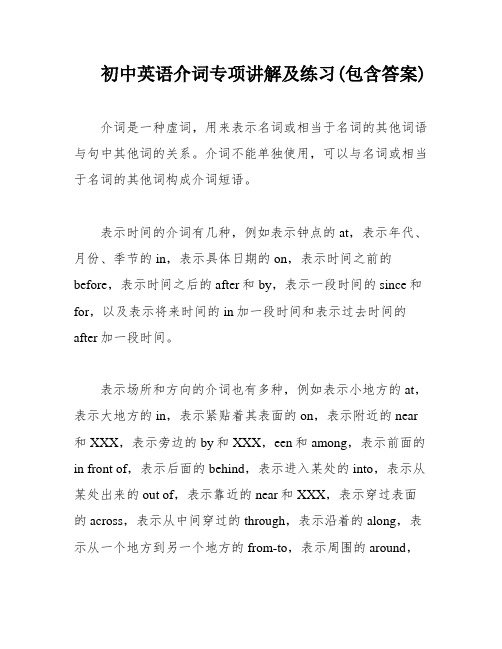
初中英语介词专项讲解及练习(包含答案)介词是一种虚词,用来表示名词或相当于名词的其他词语与句中其他词的关系。
介词不能单独使用,可以与名词或相当于名词的其他词构成介词短语。
表示时间的介词有几种,例如表示钟点的at,表示年代、月份、季节的in,表示具体日期的on,表示时间之前的before,表示时间之后的after和by,表示一段时间的since和for,以及表示将来时间的in加一段时间和表示过去时间的after加一段时间。
表示场所和方向的介词也有多种,例如表示小地方的at,表示大地方的in,表示紧贴着其表面的on,表示附近的near和XXX,表示旁边的by和XXX,een和among,表示前面的in front of,表示后面的behind,表示进入某处的into,表示从某处出来的out of,表示靠近的near和XXX,表示穿过表面的across,表示从中间穿过的through,表示沿着的along,表示从一个地方到另一个地方的from-to,表示周围的around,表示正上方的over,表示正下方的under,表示斜上方的above,表示斜下方的below。
介词的使用需要根据具体情况来判断,掌握介词的用法可以帮助我们更准确地表达自己的意思。
In using a language。
it'XXX to know about the culture and customs of the people you are XXX my experience。
as someone who has lived in different countries。
it's important to adapt and be respectful。
just like you would in your own country.With the right clothing and knowledge。
you can XXX。
(完整word版)初中介词(表时间地点介词)讲解练习及答案.doc
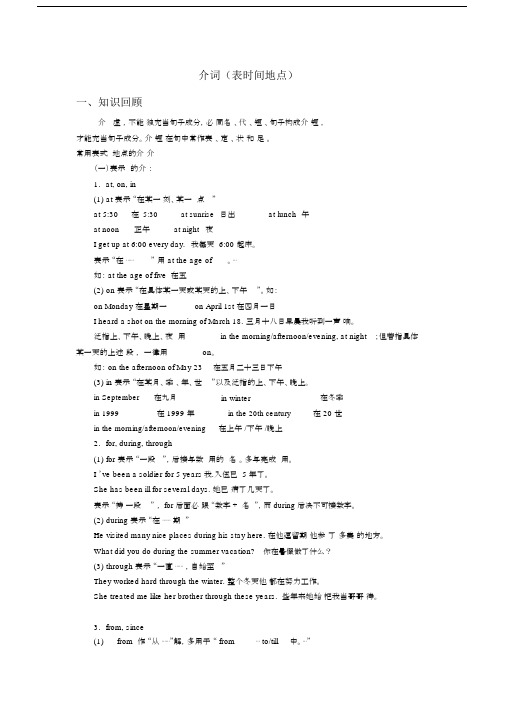
介词(表时间地点)一、知识回顾介虚,不能独充当句子成分,必同名、代、短、句子构成介短,才能充当句子成分。
介短在句中常作表、定、状和足。
常用表式地点的介介(一)表示的介:1. at, on, in(1)at 表示“在某一刻、某一点”at 5:30 在5:30 at sunrise 日出at lunch 午at noon 正午at night 夜I get up at 6:00 every day.我每天6:00起床。
表示“在⋯⋯” 用at the age of。
⋯如: at the age of five 在五(2)on 表示“在具体某一天或某天的上、下午”。
如:on Monday 在星期一on April 1st 在四月一日I heard a shot on the morning of March 18. 三月十八日早晨我听到一声响。
泛指上、下午、晚上、夜用in the morning/afternoon/evening, at night;但若指具体某一天的上述段,一律用on。
如: on the afternoon of May 23在五月二十三日下午(3)in 表示“在某月、季、年、世”以及泛指的上、下午、晚上。
in September 在九月in winter 在冬季in 1999 在 1999 年in the 20th century 在 20 世in the morning/afternoon/evening 在上午 /下午 /晚上2. for, during, through(1)for 表示“一段”,后接与数用的名。
多与完成用。
I ’ve been a soldier for 5 years我.入伍已 5 年了。
She has been ill for several days. 她已病了几天了。
表示“持一段” , for 后面必跟“数字 +名”,而 during 后决不可接数字。
【初中英语】介词专项练习题及答案详解

【初中英语】介词专项练习题及答案详解一、初中英语介词1.The Dragon Boat Festival falls_________ May or June every year.A. inB. onC. atD. between【答案】A【解析】【分析】句意:端午节每年五月或六月举行。
May or June五月或六月,月份前需用介词in,故选A。
【点评】考查时间介词辨析,注意in,on,at的用法。
2.The People's Republic of China was founded ________ October 1st, 1949. We'll celebrate its 70th anniversary this year.A. inB. onC. at【答案】 B【解析】【分析】句意:中华人民共和国成立于1949年10月1日。
今年我们要庆祝它70周年。
A.in在,用在世纪、年、季节、月、周等前;B.on在,用于星期几和具体的日期等前;C.at在,用于表示时刻前。
根据句子中 October 1st, 1949,表示具体的日期,要用介词on。
【点评】考查介词辨析。
根据句子的语法结构选择正确的介词。
3.Humans can not make progress dreams.A. withB. withoutC. throughD. about【答案】 B【解析】【分析】句意:没有了梦想,人类就不会进步。
A.带着,有;B.没有;C.通过;D.关于。
梦想是人类前进的动力,根据Humans can not make progress,可知人类不会进步,是因为没有梦想,应会使用介词without,故答案是B。
【点评】考查近词辨析,注意识记介词without的用法。
4. , I found the job boring, but soon I got used to it.A. To start withB. First of allC. Without doubtD. After all【答案】 A【解析】【分析】句意:起初我觉得工作很无聊,但是我很快就适应了。
【初中英语】介词专项练习(附答案)
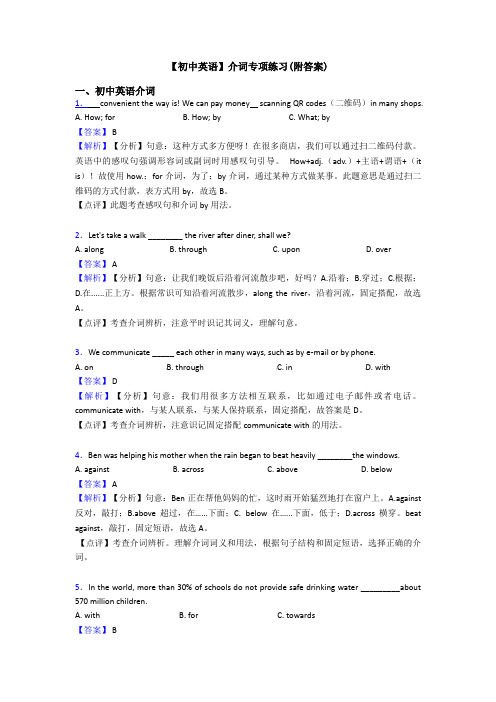
【初中英语】介词专项练习(附答案)一、初中英语介词1. convenient the way is! We can pay money scanning QR codes(二维码)in many shops.A. How; forB. How; byC. What; by【答案】 B【解析】【分析】句意:这种方式多方便呀!在很多商店,我们可以通过扫二维码付款。
英语中的感叹句强调形容词或副词时用感叹句引导。
How+adj.(adv.)+主语+谓语+(it is)!故使用how.;for介词,为了;by介词,通过某种方式做某事。
此题意思是通过扫二维码的方式付款,表方式用by,故选B。
【点评】此题考查感叹句和介词by用法。
2.Let's take a walk ________ the river after diner, shall we?A. alongB. throughC. uponD. over【答案】 A【解析】【分析】句意:让我们晚饭后沿着河流散步吧,好吗?A.沿着;B.穿过;C.根据;D.在......正上方。
根据常识可知沿着河流散步,along the river,沿着河流,固定搭配,故选A。
【点评】考查介词辨析,注意平时识记其词义,理解句意。
3.We communicate _____ each other in many ways, such as by e-mail or by phone.A. onB. throughC. inD. with【答案】 D【解析】【分析】句意:我们用很多方法相互联系,比如通过电子邮件或者电话。
communicate with,与某人联系,与某人保持联系,固定搭配,故答案是D。
【点评】考查介词辨析,注意识记固定搭配communicate with的用法。
4.Ben was helping his mother when the rain began to beat heavily ________the windows.A. againstB. acrossC. aboveD. below【答案】 A【解析】【分析】句意:Ben正在帮他妈妈的忙,这时雨开始猛烈地打在窗户上。
初中英语介词解题技巧讲解及练习题(含答案)含解析
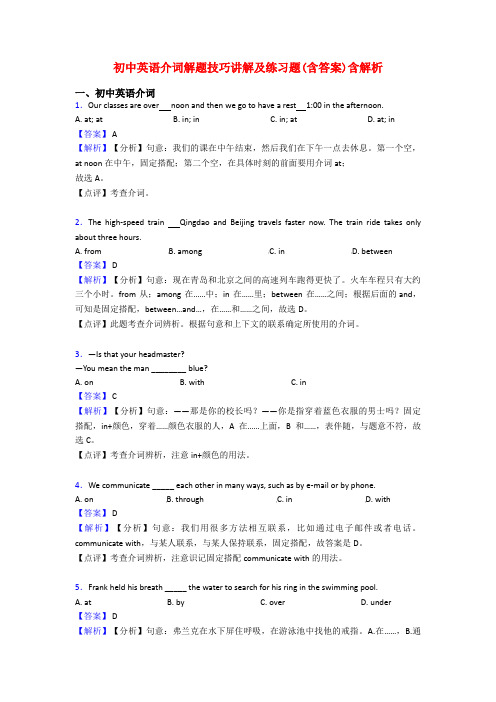
初中英语介词解题技巧讲解及练习题(含答案)含解析一、初中英语介词1.Our classes are over noon and then we go to have a rest 1:00 in the afternoon. A. at; at B. in; in C. in; at D. at; in【答案】 A【解析】【分析】句意:我们的课在中午结束,然后我们在下午一点去休息。
第一个空,at noon在中午,固定搭配;第二个空,在具体时刻的前面要用介词at;故选A。
【点评】考查介词。
2.The high-speed train Qingdao and Beijing travels faster now. The train ride takes only about three hours.A. fromB. amongC. inD. between【答案】 D【解析】【分析】句意:现在青岛和北京之间的高速列车跑得更快了。
火车车程只有大约三个小时。
from 从;among 在……中;in 在……里;between 在……之间;根据后面的and,可知是固定搭配,between…and…,在……和……之间,故选D。
【点评】此题考查介词辨析。
根据句意和上下文的联系确定所使用的介词。
3.—Is that your headmaster?—You mean the man ________ blue?A. onB. withC. in【答案】 C【解析】【分析】句意:——那是你的校长吗?——你是指穿着蓝色衣服的男士吗?固定搭配,in+颜色,穿着……颜色衣服的人,A 在……上面,B 和……,表伴随,与题意不符,故选C。
【点评】考查介词辨析,注意in+颜色的用法。
4.We communicate _____ each other in many ways, such as by e-mail or by phone.A. onB. throughC. inD. with【答案】 D【解析】【分析】句意:我们用很多方法相互联系,比如通过电子邮件或者电话。
中考英语介词专项知识讲解及练习题(含答案)

中考英语介词专项知识讲解及练习题(含答案)专项五介词(高频:5年8考;单选、完形、词语运用)知识导图考点一:方式介词(6年4考)1、by, in,on表交通方式(1)by+交通工具(名词为单数)。
如:by bike;by bus;by sea;by air(2)in+限定词(冠词、物主代词、指示代词等)+封闭型交通工具。
如:in a carOn+限定词(冠词、物主代词、指示代词等)+开放型或半开放型交通工具。
如:on my bike2、with, in, on, by表手段或工具with+具体的工具或者身体部位;on表示通过,用in+语言、声音、原材料;by+doing表示方式、手段【现学现用】1.Children start to learn to eat ________ chopsticks.2.She is talking to her father ________ the phone.3.I paid the meal ________ cash.4.She usually goes to school ________ subway.5.They went there ________ the train.6.He can chat online _____________________(用日语).7. They make much money _________________________(靠卖鞋).考点二:方位介词(2017.27;2017.71)1、表方位的in, on,to表示地理位置时:in表示所属关系,to表示非所属关系,on 表示毗邻关系。
如:China lies in the east of Asia and to the north of Australia.此外:in表示在大地方或范围内;at表示在小地方或旁边;on表示在上面;to表示到...,通向.....2、over, above, on 用法区别over表示正上方,垂直关系,above泛指上方,表面不接触,on指上方,表面有接触。
初中英语介词专项讲解及练习(包含答案)

初中英语介词专项讲解及练习(包含答案)XXXXXX are n words used to XXX and other words in a sentence。
They cannot be used alone and are often used to form nal phrases.XXX TimeAt" is used to indicate a specific time。
such as "at 6:30"。
Itis also used in fixed phrases like "at noon"。
"at night"。
and "at present" or "at the moment".In" is used to indicate a time d。
such as "in July"。
"in 2006"。
"in September 1998"。
or "in spring"。
It is also used in fixed phrases like "in the morning"。
"XXX"。
and "in the evening".On" is used to indicate a specific date。
such as "on Monday"。
"on Sunday morning"。
or "on December 17".Before" is used to indicate a time earlier than a specific event。
中考英语语法专项复习讲解及训练 介词(含答案)

中考英语语法专项复习介词介词是一种用来表示词与词,词与句之间的关系的词。
在句中不能单独作句子成分。
介词后面一般有名词代词或相当于名词的其他词类,短语或从句作它的宾语。
介词和它的宾语构成介词词组,在句中作状语,表语,补语或介词宾语。
中考主要考查表示时间的介词、表示方位的介词、表示方式、手段、或工具的介词by,in,on,with和介词的固定搭配。
对于介词的考察,通常是以单项选择或完形填空形式考查介词用法,尤其是几个易混淆的介词。
另外,介词与动词和形容词构成的固定搭配也是常见的考试内容。
一、表示时间的介词思维导图记知识点时间介词二、表示方位的介词 思维导图记知识点 介词on 表示一物放在另一物上面,两者紧贴在一起方位介词三、表示方式、手段、或工具的介词by,in,on,with.用by 时,交通工具前不用任何词四.常用介词辨析1.in 和on的区别两个词都有“在...后”之意,behind 只表示位置方面的“在....之后”,不能表示时间,而after则表示时间方面的“在...之后”behind the school 在学校后面after 5 o’clock 5点以后(1)of sb 用于It is +adj+of sb to do sth 句型中,形容词为clever, kind , nice 等描述人物性格特征的词,of 后的人物与形容词有主表关系。
It is very kind of you to help the old man .你帮助那位老人真是太好了。
(2)for sb用于It is adj+for sb to do sth 句型中,形容词为easy, important 等不描述人物性格特征的词,for 后的人物与形容词没有主表关系。
It is important for us to study hard 对我们来说努力学习很重要。
15.to的两种用法的区别to 既是介词,又是动词不定式符号。
(完整版)初中英语语法介词用法讲解与练习
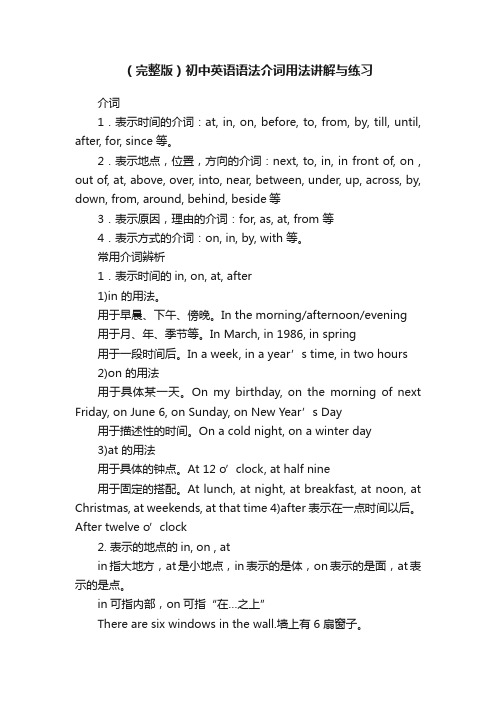
(完整版)初中英语语法介词用法讲解与练习介词1.表示时间的介词:at, in, on, before, to, from, by, till, until, after, for, since 等。
2.表示地点,位置,方向的介词:next, to, in, in front of, on , out of, at, above, over, into, near, between, under, up, across, by, down, from, around, behind, beside等3.表示原因,理由的介词:for, as, at, from 等4.表示方式的介词:on, in, by, with 等。
常用介词辨析1.表示时间的in, on, at, after1)in 的用法。
用于早晨、下午、傍晚。
In the morning/afternoon/evening用于月、年、季节等。
In March, in 1986, in spring用于一段时间后。
In a week, in a year’s time, in two hours2)on 的用法用于具体某一天。
On my birthday, on the morning of next Friday, on June 6, on Sunday, on New Year’s Day用于描述性的时间。
On a cold night, on a winter day3)at 的用法用于具体的钟点。
At 12 o’clock, at half nine用于固定的搭配。
At lunch, at night, at breakfast, at noon, at Christmas, at weekends, at that time 4)after 表示在一点时间以后。
After twelve o’clock2. 表示的地点的in, on , atin指大地方,at是小地点,in表示的是体,on表示的是面,at表示的是点。
初中英语介词专项讲解和练习(包含答案)

一.介词的含义介词是一种虚词,用来表示名词或相当于名词的其它词语与句中其它词的关系,不能单独使用。
介词可以与名词或相当于名词的其它词构成介词短语。
二.表示时间的介词at (表示钟点): at 6:30 固定搭配: at noon ; at night ; at present / atthe momentin (表示年代/月份/季节): in July; in 2006; in September,1998 ; in spring固定搭配: in the morning / in the afternoon / in theeveningon (表示具体日期: 某月某日/星期几): on Monday ; on Sunday morning ; on December17before在 --- 之前after 在--之后by在--之前(时间);到--为止until / till : 直到 --(时间)since自从 -- 以来for(接一段时间)during 在 -- 期间from 从--时起in + 一段时间: --以后(用于将来时)within --之内after+ 一段时间:--以后(用于过去时) beyond --之外三.表示场所,方向的介词at 在某处(小地方)(at the cinema; at school; at home; at the railway station)in 在某处(大地方)(in China; in Beijing);在--里面(in the classroom; in thewater)on 在--上面(紧贴着其表面): (on the table; on one’s face)near 在---附近 beside:在--旁边by 在--旁边between在--和--之间among在--(3者或更多的人或物)当中in front of 在--的前面behind 在--的后面 beside: 在—旁边into 进入--里out of 从--中出来 near / nest to 靠近across穿过(沿着表面)through穿过(从中间)along 沿着from -- to -- 从--到-- around 在--周围over 在--的正上方under在--的正下面/ above 在--斜上方below 在--斜下方四.其他介词in 用(某种语言),穿着(某种颜色的衣服)about大约;关于 from 来自 --- as像--(接句子);正如--; like 像--(接单词)with和--起;用-- without 没有-- by通过(某种方式或手段);乘坐by bus(train /plane /ship /bike)on foot五.重要介词辨析(1)on, over与aboveOn 在……上面与物体表面有接触面Over 在……上方垂直正上方,表示“跨越,覆盖”Above在……上方“在……(偏)上方”,表示两者不接触例如:There is a bag on the desk.The lamp is over the table.The heaven is above us.(苍天在上。
初一英语介词专题讲解及练习
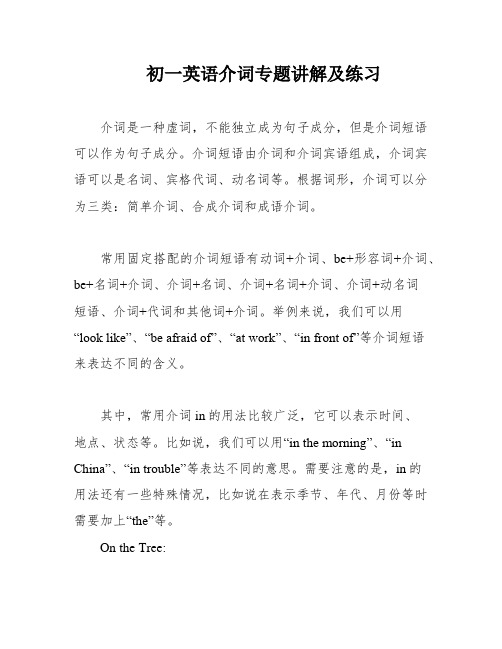
初一英语介词专题讲解及练习介词是一种虚词,不能独立成为句子成分,但是介词短语可以作为句子成分。
介词短语由介词和介词宾语组成,介词宾语可以是名词、宾格代词、动名词等。
根据词形,介词可以分为三类:简单介词、合成介词和成语介词。
常用固定搭配的介词短语有动词+介词、be+形容词+介词、be+名词+介词、介词+名词、介词+名词+介词、介词+动名词短语、介词+代词和其他词+介词。
举例来说,我们可以用“look like”、“be afraid of”、“at work”、“in front of”等介词短语来表达不同的含义。
其中,常用介词in的用法比较广泛,它可以表示时间、地点、状态等。
比如说,我们可以用“in the morning”、“in China”、“in trouble”等表达不同的意思。
需要注意的是,in的用法还有一些特殊情况,比如说在表示季节、年代、月份等时需要加上“the”等。
On the Tree:XXX are called "on the tree"。
This can refer to fruits。
leaves。
branches。
or anything else that is attached to the tree。
In the Tree:When we say "in the tree"。
we are usually XXX or living in the tree。
Using "In" and "With":When we use "in"。
we are talking about the material that something is made of。
For example。
we write in ink or in pencil。
When we use "with"。
初中英语介词专项练习(附答案)含答案解析
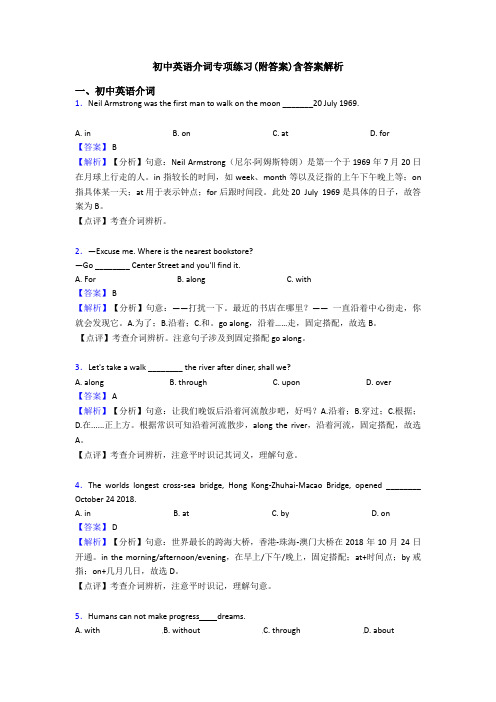
A. at B. by C. over D. under
【答案】D
【解析】【分析】句意:弗兰克在水下屏住呼吸,在游泳池中找他的戒指。A.在……,B.通过某种方式;C.高于;D.在……下,面。根据Frank held his breath和in the swimming,可知一定是在水下,应使用介词under,故答案是D。
【点评】考查近词辨析,注意识记介词without的用法。
6.My mother often says, "Stand tall like the sunflower and be proudwho you are."
A. of B. with C. at D. in
【答案】A
【解析】【分析】句意:我妈妈经常说,像向日葵一样挺起胸膛,为自己感到骄傲。be proud of,固定搭配,为……骄傲,故选A。
【点评】考查介词辨析,注意结合语境思考问题并解决问题。
9.In the world, more than 30% of schools do not provide safe drinking water _________about 570 million children.
A. with B. for C. towards
【点评】考查介词辨析。
2.—Excuse me. Where is the nearest bookstore?
—Go ________ Center Street and you'll find it.
七年级介词详细讲解与练习题

初一介词讲解及练习介词:介词是虚词,不能独立充当句子成分介词短语能够充当句子成分介词短语= 介词+介词宾语(名词、宾格代词、动名词等充当)根据词形,介词分为三类:1简单介词:in, on, from, at, for合成介词:upon, into, onto, inside, without成语介词:由两个以上单词合成。
in front of, in the middle of, on top of一、常用固定搭配的介词短语形式1.动词+ 介词look like; look at; talk to; think of2.be + 形容词+ 介词be surprised at; be afraid of3.be + 名词+ 介词be mad at sb; the key to; the way to4.介词+ 名词at work; at home; at school; at last; on thefarm5.介词+ 名词+ 介词in front of; at the age of; at the endof6.介词+ 动名词短语after leaving school; after finishing it7.介词+ 代词for her; from each other; after him8.其他词+ 介词instead of; because of; according to举例:1. She looks like her mother.2. Your coat looks very nice. What’s it made of?3. Would you please show me the way to the bank?4. My father is working at the office.5. Don’t stand in front of the car. It’s too dangerous.6. Please tide your schoolbag before leaving school.7. It is dangerous for her to swim along.8. What a nice day! We should go sightseeing instead of watching TV in the hotel.常用介词用法:in 的用法:1. in on at 的用法区别:in表示一日中上午、下午、晚上或周、月、季、年on表示日、周日或特定某日中的一段时间at表示点钟,一日中的黎明、中午、黄昏、半夜等in the evening, in the week, in August, in spring, in 2013, in three dayson Monday, on May the first, on a rainy day, on July 10, 2013at five, at night,2. in into inside的用法区别;He spent about 21 hours in space.China sent a man into space.Yang Liwei was inside.in 的用法比较多,在这里只讲这三个有共同的意识:‘在...里’的区别in 在上面句子里是介词,表示‘在...里’into 强调由外及的过程,而in不强调inside ‘在...里面’,有名词,介词,形容词,副词用法,在上面句子里是名词,而in 不能表示这种意识3. in与after的用法区别;We went there in six days. (过去时中in表....时间)We went there after six days. (过去时中after表....时间后)We often do our homework after school. (固定词组, after class; after supper等)After finishing his homework, he went to bed. ( after+动名词)He will come in two days. (将来时中in表....时间后)He will come within two days. (将来时within表....时间)My mother often goes to work after 8 o’clock. (现在时中after+时间点表....时间后)4. in ,on 在…上on 表示两个物体的接触,但不表深度,如墙上的黑板、地图、图画in 表示在…上必须具有某种深度,如墙上的门、窗、洞等on 打在某人的头上、腿上、鼻子上等in 打在某人的(脸上、腹部等)on the tree 树上长出的东西in the tree 用来指外界的人、动物在树上5. in with 的用法:in 后所用的材料in ink; in pencil; Don’t write a letter in pencil.with 后加所用的工具He does his homework with a pencil.6. in dress wearThe girl in the hat is my friend. (in或be in表状态)She had on a red dress. (have on表状态)He often wears a sweater. (wear表状态)Here is a coat for you. You’d better put it on. (put on表动作) She got up and dressed herself quickly. (dress sb或dress oneself既表动作又表状态)7. in time 和on time 的区别We were just in time for the bus. 及时The train arrived on time. 准时8. in bed, on the bed的区别He is ill. He is in bed all day. 卧床,睡觉A nice box is on the bed. 床上躺着休息或某物在床上9. in on to 的区别China is in the east of the world.(in表示在某一地区之的某方位) Korea is on the east of China. (on表示与某地相邻)Japan is to the east of China. (to表示在某一地区之外的某方位).Taiwan is in the south of China.(和大陆虽然以海相隔,但是我国的一个省,要用in)10. in the street 和on the street的用法表示“在街上”时,英国常用前者,美国常用后者11. in hospital in the hospitalShe is in hospital. 在住院She is in the hospital. 在医院工作12. in school 在学习at school 在学校;在上课其他词组:keep in mind 牢记be in contact with和…联系with的用法:用…工具write with a pencut with knifefill withsee with our eyes表示伴随状态with a wordwith a smilebring sth with sbtake sth with sb固定搭配:with the help ofbe busy with重点句:After the final exam, Peter,with her parents, is going to travel to Canada instead of staying at home all the time.by 的用法:by 表示“到…之前”by seven o’clock by now by the end of last yearby yesterday by thenBy tomorrow, I’ll have the outstanding (出售) five percent. 到了明天,我将得到未出售的百分之五。
(英语)初中英语介词专项训练及答案及解析

(英语)初中英语介词专项训练及答案及解析一、初中英语介词1.This story is_________ simple English. My little sister can read it.A. forB. inC. withD. by【答案】 B【解析】【分析】句意:这个故事是用简单的英语写的。
我妹妹会读。
A:for为;B:in 用; C: with带有; D: by被,由。
用某种语言,要有in+某种语言,故选B。
【点评】考查介词辨析。
理解选项意思和用法,根据句子结构,选择正确的介词。
2.—Is there ________ in today's morning news on CCTV-1?—Yes, France Team beat Korea Team by 4: 0 in the 8`h FIFA Women's World Cup in France ________ June 8, 2019.A. anything special; onB. something special; inC. special something; onD. anything special; in【答案】 A【解析】【分析】句意:——在央视一今日新闻里有特殊的事情吗?——是的。
法国队在2019年6月8日的法国第八届女子足球世界杯中以4:比0的成绩击败了韩国队。
复合不定代词+形容词,排除B、C。
问句是一般疑问句,所以用anything;on+几月几日,June 8 是几月几日,具体日期,所以用on,故选A。
【点评】考查复合不定代词及介词用法,注意平时识记,理解句意。
3.The People's Republic of China was founded ________ October 1st, 1949. We'll celebrate its 70th anniversary this year.A. inB. onC. at【答案】 B【解析】【分析】句意:中华人民共和国成立于1949年10月1日。
英语介词专题练习(及答案)含解析

英语介词专题练习(及答案)含解析一、初中英语介词1.Stephen Hawking was famous a scientist, he made a great contribution to the world, and he died March 14th, 2018.A. for; onB. as; inC. as; on【答案】 C【解析】【分析】句意:史蒂芬·霍金作为科学家而闻名,他为世界做出了巨大的贡献,他逝世于2018年3月14日。
空一,根据 a scientist ,可知是作为……而出名,be famous as;空二,具体到某一天,使用介词on。
故选C。
【点评】此题考查固定短语和介词用法。
2.My brother joined the army ________ September last year.A. onB. byC. atD. in【答案】 D【解析】【分析】句意:我哥哥去年九月参军。
on后接具体的日期、星期和节日;by后接方式;at后接时间点、时刻;in后接某年某月;September,9月,因此前面用in,故选D。
【点评】此题考查介词。
注意表示年月动名词前用介词in。
3.I'll be at home __________ Sunday morning. You can phone me then.A. onB. inC. atD. to【答案】 A【解析】【分析】句意:在周日早上我将在家,那时你可以给我打电话。
on+具体时间;in+the+morning/afternoon/evening,在早上/下午/晚上;at+时间点。
Sunday morning指的是周日早上,指的是具体日期,所以用on,故选A。
【点评】考查介词辨析,注意平时识记on、in、at的区别。
4.—Shall I help you ________ the street, Grandpa?—No, thanks. I can manage it myself.A. onB. withC. acrossD. along【答案】 C【解析】【分析】句意:——爷爷,我可以帮助你过马路吗?——不用,谢谢。
必备英语初中英语介词专项练习(附答案)含答案解析

必备英语初中英语介词专项练习(附答案)含答案解析一、初中英语介词1.Our classes are over noon and then we go to have a rest 1:00 in the afternoon. A. at; at B. in; in C. in; at D. at; in【答案】 A【解析】【分析】句意:我们的课在中午结束,然后我们在下午一点去休息。
第一个空,at noon在中午,固定搭配;第二个空,在具体时刻的前面要用介词at;故选A。
【点评】考查介词。
2.—Is there ________ in today's morning news on CCTV-1?—Yes, France Team beat Korea Team by 4: 0 in the 8`h FIFA Women's World Cup in France ________ June 8, 2019.A. anything special; onB. something special; inC. special something; onD. anything special; in【答案】 A【解析】【分析】句意:——在央视一今日新闻里有特殊的事情吗?——是的。
法国队在2019年6月8日的法国第八届女子足球世界杯中以4:比0的成绩击败了韩国队。
复合不定代词+形容词,排除B、C。
问句是一般疑问句,所以用anything;on+几月几日,June 8 是几月几日,具体日期,所以用on,故选A。
【点评】考查复合不定代词及介词用法,注意平时识记,理解句意。
3.Humans can not make progress dreams.A. withB. withoutC. throughD. about【答案】 B【解析】【分析】句意:没有了梦想,人类就不会进步。
A.带着,有;B.没有;C.通过;D.关于。
【初中英语】 介词专项讲解及练习(1)

必备英语【初中英语】介词专项讲解及练习一、初中英语介词1.—Bill, did you see Tom?—Yes, he just parked his car here and then hurried the street.A. throughB. overC. pastD. across【答案】 D【解析】【分析】句意:—比尔, 你看见汤姆了吗?—是的,他刚刚把车停在这儿,然后匆忙穿过街道。
A. through穿过(从物体中间穿过);B. over越过(在物体上方,不接触);C. past经过(从旁边经过);D. across穿过(从物体表面横穿),穿过街道应该是从表面穿过,用across。
故选D。
【点评】考查介词辨析。
熟记这些介词的含义。
2.I'll be at home __________ Sunday morning. You can phone me then.A. onB. inC. atD. to【答案】 A【解析】【分析】句意:在周日早上我将在家,那时你可以给我打电话。
on+具体时间;in+the+morning/afternoon/evening,在早上/下午/晚上;at+时间点。
Sunday morning指的是周日早上,指的是具体日期,所以用on,故选A。
【点评】考查介词辨析,注意平时识记on、in、at的区别。
3.I will go around the city of Dalian by light-rail vehicle(轻轨) subway because I haven't taken it before.A. instead ofB. in the face ofC. along withD. across from【答案】 A【解析】【分析】句意:我打算不坐地铁,坐轻轨车参观大连,因为我以前从没有坐过。
A.而不是;B.面对;C.和……一起;D.在……对面。
- 1、下载文档前请自行甄别文档内容的完整性,平台不提供额外的编辑、内容补充、找答案等附加服务。
- 2、"仅部分预览"的文档,不可在线预览部分如存在完整性等问题,可反馈申请退款(可完整预览的文档不适用该条件!)。
- 3、如文档侵犯您的权益,请联系客服反馈,我们会尽快为您处理(人工客服工作时间:9:00-18:30)。
初中英语介词专项讲解及练习(包含答案)-CAL-FENGHAI.-(YICAI)-Company One1一.介词的含义介词是一种虚词,用来表示名词或相当于名词的其它词语与句中其它词的关系,不能单独使用。
介词可以与名词或相当于名词的其它词构成介词短语。
二.表示时间的介词at (表示钟点): at 6:30 固定搭配 : at noon ; at night ; at present / at themomentin (表示年代/月份/季节): in July; in 2006; in September,1998 ; in spring固定搭配: in the morning / in the afternoon / inthe eveningon (表示具体日期: 某月某日/星期几): on Monday ; on Sunday morning ; onDecember 17before在 --- 之前after 在--之后by在--之前(时间);到--为止until / till : 直到 --(时间)since自从 -- 以来for(接一段时间)during 在 -- 期间from 从--时起in + 一段时间: --以后(用于将来时)within --之内after+ 一段时间:--以后(用于过去时) beyond --之外三.表示场所,方向的介词at 在某处(小地方)(at the cinema; at school; at home; at the railwaystation)in 在某处(大地方)(in China; in Beijing);在--里面(in the classroom; inthe water)on 在--上面(紧贴着其表面): (on the table; on one’s face)near 在---附近 beside:在--旁边by 在--旁边between在--和--之间among在--(3者或更多的人或物)当中in front of 在--的前面behind 在--的后面 beside: 在—旁边into 进入--里out of 从--中出来 near / nest to 靠近across穿过(沿着表面)through穿过(从中间)along 沿着from -- to -- 从--到-- around 在--周围over 在--的正上方under在--的正下面 / above 在--斜上方below 在--斜下方四.其他介词in 用(某种语言),穿着(某种颜色的衣服)about大约;关于 from 来自 ---as像--(接句子);正如--; like 像--(接单词)with和--起;用-- without 没有--by通过(某种方式或手段);乘坐by bus(train /plane /ship /bike)on foot五.重要介词辨析(1)on, over与aboveOn 在……上面与物体表面有接触面Over 在……上方垂直正上方,表示“跨越,覆盖”Above在……上方“在……(偏)上方”,表示两者不接触例如:There is a bag on the desk.The lamp is over the table.The heaven is above us.(苍天在上。
)(2)in, on 与toin 用于主语被包含于某一范围之内。
on 用于表示两地互相接壤。
to 用于主语在某一范围之外。
例如:Beijing lies in the north of China.北京位于中国的北部。
Rusia is on the north of China.俄罗斯在中国的北面。
Japan is to the east of China.日本在中国的东面。
(3)across, over, through 与pastacross “穿过”强调从物体表面的这一边到另一边over “越过”强调从人或事物的上方经过,越过through “穿过,通过”强调从物体内部穿过;从长形物的一头到另一头。
past “经过”只从物体旁边经过例如:If you see the green light, you can walk across the street.The train run through the tunnel(隧道).I can jump over the fence(围墙).We walked past the hospital.(4) except, except for, besides与butexcept “除……以外”表示同类事物之间的关系except for “除……以外”,“如果不是”,“若非”表示对局部的否定,不表示同类事物之间的关系besides “除……以外”,“还有……”所指事物包括在叙述范围之内but “除……以外”多与nobody, none, no one, nothing, anything, everyone, all,who连用例如:We all went swimming except Ann.Besides Ann, we all went swimming.Your composition is good except for some spelling mistakes.No one but Peter went there.(5) in front of 与in the front of “在……前面”in front of 指一个物体在另一个物体的前方in the front of 指一个物体包含在另一个物体内部的前方There is a big tree in front of the classroom.There is a desk in the front of the classroom.(6) since 与 forsince “自从……”后跟时间点或动作初始的句子,用于现在完成时态。
for “达,计……”后跟时间段,用于现在完成时态。
例如:I have learned English since 2002.We have known each other since I was a little boy.They have lived here for ten years.介词专项训练1. Mary is flying to Italy. She will arrive Paris the morning of July 9.A. at / inB. in / onC. in / inD. at / on2. China lies the east of Asia and the north of Australia.A. to / toB. to / inC. in / onD. in / to3. -- What time did you get there this morning -- eight.A. InB. OnC. AtD. From4. the help of Liu Tao, I have made much progress in English recently.A. UnderB. InC. WithD. On5. Last night I did my homework 11 o’clcok, so I got up late this morhing.A. untilB. atC. fromD. in6. I’ll return back to Qingdao a few days.A. sinceB. inC. onD. after7. I prefer coffee tea, and so I often drink coffee instead tea.A. from / toB. with / atC. to / ofD. for / of8. We can’t live air or water.A. withB. out ofC. inD. without9. When Li Ming talks to foreigners, he always thinks Chinese first, then he turns her words English.A. by / toB. in / intoC. with / intoD. through / to 10.Qingdao is famous Qingdao Beer and Zhanqiao Pier.A. forB. asC. toD. with11.It’s impolite to laugh someone who makes mistakes.A. toB. onC. atD. into12.Finally I came up a good idea to solve the problem.A. withB. toC. atD. on13.-- Is this car yours-- No, it’s not mine. It belongs Peter.A. withB. toC. inD. at14.May 4 Square and Zhanqiao Pier are regarded the symbol of Qingdao.A. toB. onC. inD. as15.Great changes have taken place in Qingdao 2008.A. afterB. beforeC. sinceD. for16.We always provide the customers a good after-sale service.A. forB. withC. toD. from17.My mobile phone is different yours.A. fromB. toC. atD. in18.This method is not suitable me. I’ll think about other ones.A. toB. atC. forD. with19.I have been working three hours, so I feel a bit tired.A. afterB. inC. sinceD. for20.Fruits watermelon are very popular in summer.A. asB. likeC. forD. with21.I paid 3000 yuan the computer.A. forB. toC. onD. in22. the end, we decided to go to the zoo together the next Sunday.A. AtB. InC. OnD. With23.I always go home Wei Hua school.A. after / atB. to / beforeC. with / afterD. without / from 24. the time I arrived the railway station, the train had already left.A. At / toB. In / intoC. After / onD. By / at25.Tom often make some mistakes because his carelessness.A. ofB. offC. toD. at26.-- Would you like some coffee-- Yes, please. By the way, do you have any milk I prefer coffee milk.A. fromB. withC. toD. for27. I didn’t go to bed last night I finished my homework.A. atB. fromC. inD. until28.I usually go to school foot because my home is not far my school.A. by / toB. by / awayC. on / fromD. on / for 29.Mr Smith left the office saying anything.A. withB. withoutC. withinD. after30.A bird flew into the house the window.A. throughB. acrossC. fromD. behind 31. the night of August 8, 2008, the Opening Ceremony of the 29th Olympic Games was held in Beijing.A. InB. OnC. ForD. At 32.Linda always spends too much money clothes.A. forB. inC. onD. with33.Your backpack is similar mine.A. toB. withC. forD. about34.I will go to Hangzhou two weeks.A. forB. inC. afterD. with35.My father is always busy his work.A. withB. onC. inD. for36.It is usually cold winter the north of China.A. on / atB. at / onC. in / inD. at / at37.Mr Brown came to China July, 2005.A. onB. inC. atD. since38.Thanks your help, I’ve made great progress in English.A. toB. forC. ofD. X39.The buses are always crowded people.A. ofB. forC. amongD. with40.Chen Fei is learning Japanese the moment. She will leave Japan next year.A. in / toB. for / withC. at / forD. on / at 41.Whether we will go to the zoo tomorrow depends the weather.A. onB. forC. atD. in42.It’s very kind you to come to see me .A. for / ofB. of / offC. with / offD. to / with43.It is very necessary us to learn English. It is the most widely-used language the world.A. for / inB. of / atC. to / onD. with / around 44.I have been living here more than 20 years.A. sinceB. forC. afterD. before45.The man the left is Jenny. He is talking Paul over there.A. in / aboutB. to / withC. on / toD. at / about 46.Can you swim the riverA. overB. throughC. underD. across47.We should stand line when we are waiting a bus.A. on / inB. in / forC. in / onD. on / for48.Japan is the east of China, and India is the west of China.A. to / onB. on / inC. in / onD. on / to 49.I worked the problem accident.A. up / inB. with / atC. out / byD. in / with50.It is nearly 10 pm, but Tom still didn’t come home, and so his mother is very worriedhim.A. forB. aboutC. withD. on51.Chinese people like drinking tea nothing in it.A. withB. inC. onD. for52.A new railway was built the two cities.A. alongB. inC. betweenD. among53.Chen Ming does well his lessons and he is good playing football.A. with / inB. in / atC. at / withD. of / at54.The girl a blue dress is my classmate Lily.A. withB. onC. atD. in55.I usually have some bread and a glass of milk breakfast.A. forB. atC. onD. in56.It’s not necessary to look every new word the dictionary while reading.A. for / fromB. at / atC. after / inD. up / in57.Please make a sentence the new word you have just learned.A. withB. withoutC. inD. of58.There is a park the post office.A. insideB. overC. in front ofD. in the front of 59.It is said that this kind of paper is made wood and it is made Canada.A. of / atB. from / inC. out of / inD. with / from60.I like classical music instead pop music.A. atB. aboutC. onD. ofBDCCA BCDBA CABDC BACDBABCDA BDCBA BCABA CBADCABABC DBACB ACBDA DACBD。
